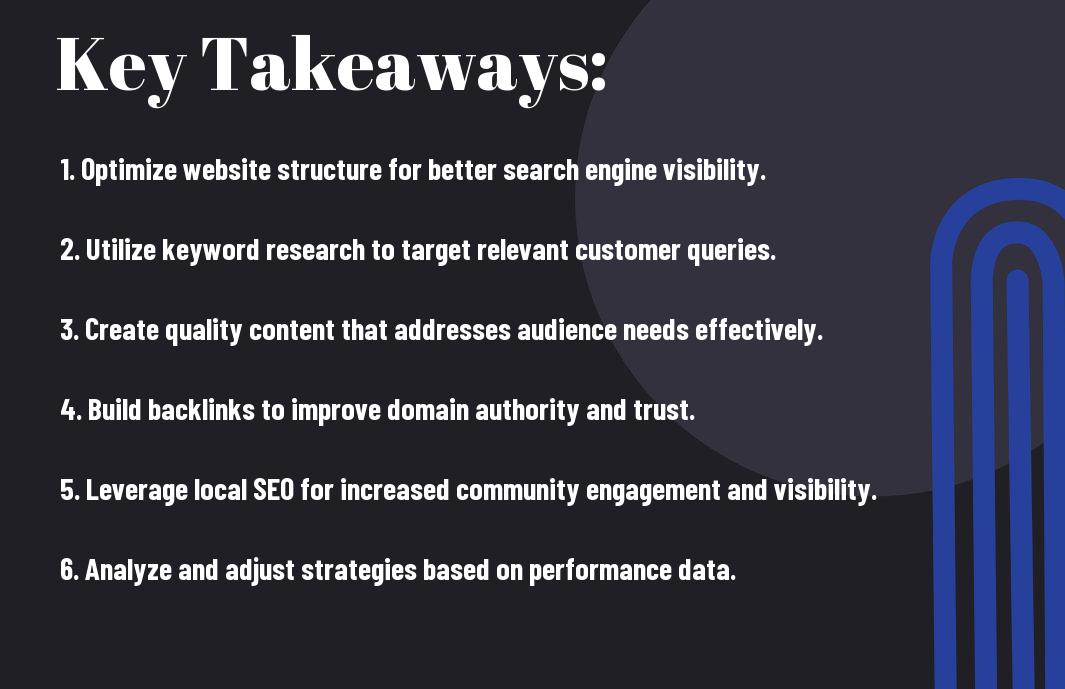Over the past few years, small businesses have witnessed a monumental shift in the way customers discover services and products online. By effectively utilizing SEO alchemy, you can transform your website into a powerful marketing tool that drives traffic, increases visibility, and enhances customer engagement. This post will guide you through the crucial strategies to optimize your online presence, ensuring that your business stands out in a crowded digital landscape and achieves the maximum impact it deserves.
Key Takeaways:
- Focus on keyword research and optimization to ensure relevant and high-quality traffic flows to your website.
- Leverage local SEO strategies to enhance visibility within your community, driving foot traffic and local online engagement.
- Create valuable content that addresses customer needs and questions to establish authority and build trust in your niche.

Understanding SEO Alchemy
While many small business owners perceive SEO as a complex puzzle, it is crucial to recognize that its principles can be distilled into manageable components. SEO alchemy involves transforming your online presence to enhance visibility and reach. By mastering the art and science of SEO, you can effectively increase brand awareness, attract quality leads, and ultimately drive more sales. Understanding these foundational elements will empower you to make informed decisions about implementing SEO strategies tailored to your business needs.
The Basics of SEO
Before entering into the depths of SEO, it is vital to grasp its foundational aspects. Search Engine Optimization (SEO) encompasses techniques and strategies designed to improve your website’s visibility on search engine results pages. This involves optimizing your content, enhancing technical aspects of your site, and building quality backlinks. Mastering these basics will set the groundwork for achieving better online performance.
Why SEO is Important for Small Businesses
At its core, SEO is about connecting your business with potential customers who are actively searching for your products or services. It allows you to compete with larger companies on a more level playing field. By ranking higher in search results, you gain increased traffic to your website, fostering opportunities to convert visitors into loyal customers.
For instance, a well-optimized website can lead to a significant uptick in organic traffic, thereby enhancing your brand visibility. This is particularly important for small businesses operating on limited marketing budgets; effective SEO means you can attract customers without spending excessively on ads. Additionally, a strong online presence builds credibility, as consumers often trust businesses that appear higher in search rankings. Thus, leveraging SEO not only amplifies your reach but also strengthens your brand’s reputation in a competitive market.
Keyword Research Mastery
Some of the most powerful strategies for SEO success begin with effective keyword research. By pinpointing the right keywords, your business can enhance visibility, cater to the specific needs of your target audience, and drive relevant traffic to your website. Understanding what your potential customers are searching for is fundamental to developing a strong online presence.
Identifying the Right Keywords
Research is the foundation of effective keyword identification. Start by analyzing your industry, current customer queries, and using tools like Google Keyword Planner or Ubersuggest. Focus on both the volume of searches and the relevance of keywords to your business. Choosing the right terms can improve your chances of ranking higher in search results.
Long-Tail vs. Short-Tail Keywords
For your keyword strategy, consider the differences between long-tail and short-tail keywords. Short-tail keywords are typically one or two words and attract high search volumes but also bring in significant competition. On the other hand, long-tail keywords are more specific phrases, usually containing three or more words, which tend to have lower competition and can attract more targeted traffic to your site.
And while short-tail keywords might drive more traffic initially, long-tail keywords are often more valuable for small businesses. They cater to a specific audience likely to convert, as they reflect a user’s precise intent. By harnessing long-tail keywords, you can position your brand as an authority in niche areas, resulting in higher engagement and increased sales opportunities.
On-Page Optimization Techniques
To effectively enhance your website’s visibility, mastering on-page optimization techniques is crucial. This involves optimizing various elements on your site, including content, images, and site structure, to ensure search engines can efficiently crawl and index your pages. By refining these aspects, you can elevate your small business’s online presence and attract more targeted traffic.
Crafting SEO-Friendly Content
Beside focusing on quality, crafting SEO-friendly content involves strategically using keywords while maintaining a natural flow. Your content should resonate with your target audience, engaging them while answering their search queries effectively. This balance not only boosts your SEO but also enhances user experience.
Importance of Meta Tags and Headers
By optimizing your meta tags and headers, you significantly improve your site’s search engine rankings. These elements guide search engines and users in understanding your content’s context, making them integral for effective on-page SEO. A well-crafted title tag and a compelling meta description can increase click-through rates from search engine results pages.
Optimization of your meta tags and headers is all about clarity and relevance. The title tag should include your primary keyword and accurately reflect your page’s content, while meta descriptions must entice users to click. Using header tags (H1, H2, H3) not only organizes your content, but it also helps search engines understand the structure and main topics of your page, enhancing your overall search visibility. When done right, these elements can greatly influence your organic traffic and user engagement.
Off-Page SEO Strategies
Now, to achieve a strong online presence, off-page SEO strategies play a vital role. These tactics enhance your website’s credibility and visibility by focusing on factors outside your site, such as backlinks, social media engagement, and your overall online reputation. Embracing these strategies can significantly increase your brand’s recognition and search engine rankings, driving more traffic to your business.
Building Quality Backlinks
For small businesses, building quality backlinks is vital for improving domain authority and search rankings. By collaborating with reputable websites and creating valuable content, you can attract backlinks that not only boost your SEO performance but also drive referral traffic to your site.
Leveraging Social Media for SEO
The power of social media in driving SEO success should not be underestimated. Engaging with your audience on platforms like Facebook, Instagram, and LinkedIn can enhance your brand visibility and contribute to your search rankings.
In fact, social media can be a game-changer for your SEO efforts. When you share valuable content, you increase the chances of obtaining backlinks and driving traffic to your site. Engaging content often leads to higher shares and interactions, which signals to search engines that your content is valuable. Additionally, maintaining an active social media presence can help you build a loyal community around your brand, further amplifying your online impact.
Local SEO for Small Businesses
All small businesses must embrace local SEO strategies to effectively reach their target audience. By optimizing your online presence for local search results, you can attract nearby customers and enhance your visibility in a competitive market. Local SEO not only helps you connect with potential clients but also allows you to showcase your products and services at a community level, creating a more personalized approach to marketing.
Optimizing Google My Business
About Google My Business (GMB) is an vital tool that allows you to manage your online presence across Google, including search results and maps. By completing your GMB profile, you can provide customers with important information, such as your business hours, address, and contact details. Ensure that you use accurate descriptions, select appropriate categories, and add high-quality images to make your listing more appealing and informative.
Importance of Local Listings
Against the backdrop of a highly competitive digital landscape, local listings serve to enhance your business’s visibility in searches specific to your region. These listings are vital as they provide potential customers with critical information such as your location, services, and operating hours. Optimizing for local listings also helps improve your rankings in search results, ultimately leading to greater foot traffic and online engagement. By ensuring consistency across platforms, you create a trustworthy image that can increase your chances of attracting more clients. Focusing on local listings can significantly elevate your business presence and increase customer trust in your offerings, resulting in better conversion rates and sustained growth.
Analyzing and Measuring SEO Success
For small businesses, tracking SEO success is important for understanding how well your strategies are performing. Regularly measuring your progress allows you to adjust tactics and maximize your online visibility, ensuring that your efforts are translating into tangible results. Implementing an effective analysis routine will help you stay ahead of the competition.
Essential SEO Metrics to Track
Behind successful SEO lies a variety of metrics, including organic traffic, keyword rankings, and conversion rates. Monitoring these metrics will give you insights into how your website performs and identify areas that need improvement. By focusing on these important data points, you can make informed decisions to enhance your overall SEO strategy.
Tools for SEO Analysis
An array of tools is available to assist you in analyzing your SEO performance, from Google Analytics to SEMrush and Moz. Each tool offers unique features such as keyword tracking, site audits, and competitor analysis, helping you uncover valuable insights. You must choose tools that fit your needs and budget, enabling you to make data-driven decisions that propel your business forward.
Considering the vast landscape of SEO tools, it’s important to find platforms that offer a balance of affordability and comprehensiveness to suit your small business. Many tools come with free versions or trials, allowing you to explore their capabilities before committing. Look for features such as real-time analytics, backlink analysis, and content optimization suggestions as these can provide significant advantages. Investing your time in the right tools can streamline your SEO efforts and greatly enhance your online presence.
To wrap up
Summing up, you can harness the power of SEO alchemy by prioritizing relevant keywords, creating high-quality content, and optimizing your website’s user experience. Utilizing local SEO strategies can enhance your visibility within your community, while building backlinks will establish your authority online. Stay updated with SEO trends and analytics to refine your approach continuously. By applying these techniques, you’ll not only improve your online presence but also attract targeted traffic that converts, laying a solid foundation for sustainable growth in your small business.
FAQ
Q: What is SEO alchemy, and how can it benefit small businesses?
A: SEO alchemy refers to the art and science of optimizing your online presence to achieve maximum visibility and engagement through search engines. For small businesses, harnessing SEO alchemy can lead to increased website traffic, enhanced brand awareness, and ultimately, more conversions and sales. By focusing on valuable keyword strategies, creating high-quality content, and optimizing website performance, small businesses can transform their online impact and compete more effectively in their industry.
Q: What are some effective SEO strategies that small businesses can implement?
A: Small businesses can adopt several effective SEO strategies to amplify their online presence. Firstly, conducting thorough keyword research to identify relevant search terms used by potential customers is vital. Secondly, creating informative and engaging content that answers user queries can improve organic search rankings. Thirdly, optimizing the website’s technical aspects, such as site speed and mobile-friendliness, enhances user experience and increases ranking potential. Lastly, securing backlinks from reputable sources can boost authority and credibility in the eyes of search engines.
Q: How can social media integration improve a small business’s SEO efforts?
A: Integrating social media with SEO initiatives can significantly impact a small business’s online visibility. Social media platforms enable content sharing, which can lead to increased traffic to the business’s website. When users share content, it creates backlinks and drives organic engagement, which search engines interpret as a signal of content value. Additionally, maintaining an active social media presence helps establish brand authority and fosters community engagement, further enhancing SEO efforts by creating more opportunities for visibility and interaction with potential customers.




